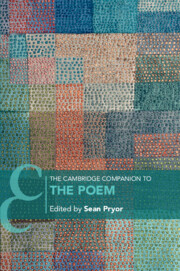Introduction
Published online by Cambridge University Press: 30 May 2024
Summary
This Introduction explores what it means to encounter a poem. What is involved when we read a poem in a book, hear a poem at a poetry slam, or translate a poem for readers of another language? What ideas about “the poem” inform such encounters, shaping what readers and audiences want from poems and what they do with them? This chapter examines the conceptual relation between the terms “poem” and “poetry,” as well as the shifting relations between “poem,” “song,” “hymn,” and other related terms. The Introduction considers how ideas about the poem have changed over history and how they differ between cultures. It then addresses several influential ideas about the poem, especially the notion of the individual poem as a unified whole and the notion of the poem as singular, as valuable in its difference from other poems. This chapter concludes that to encounter a poem is necessarily to encounter a work which, whether as object or experience, is always already entangled with other poems and with ideas of the poem as such.
- Type
- Chapter
- Information
- The Cambridge Companion to the Poem , pp. 1 - 16Publisher: Cambridge University PressPrint publication year: 2024

